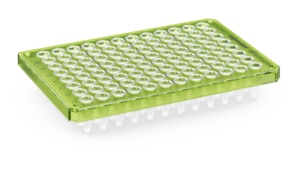BioBased 96-well PCR Plates – Now also semi-skirted

Hamburg — Our customers depend on the high performance and reliability of the plates used in their high-throughput processes. However, increased throughput results in a higher carbon footprint due to the use of single-use plates made from fossil-based plastics. There is now a growing demand for more sustainability.
Eppendorf’s biobased consumables open up new doors to make laboratory work significantly more sustainable without the need to revalidate existing protocols when switching from our legacy consumables.
Eppendorf has now expanded its portfolio with the addition of the twin.tec® Trace Plates – the automation-friendly two-component skirted and semi-skirted PCR plates – as part of the switch towards consumables made from biobased feedstock. The plates come with 96 wells and are available in translucent clear.
All components of the new plates are crafted from bio-circular polymers manufactured using second-generation renewable feedstock, following the mass balance approach. The exceptionally thin-walled wells, which ensure optimal heat transfer, are constructed from 100 % biobased polypropylene, while the rigid frame is composed of 77 % biobased polycarbonate. This combination results in a highly reliable and sustainable PCR plate.
Eppendorf twin.tec® Trace PCR Plates BioBased are manufactured in a certified ISCC PLUS* environment and have received ACT certification. All biobased Eppendorf laboratory consumables in Germany meet the requirements of the ISCC PLUS certification system and undergo regular external audits and certifications.
* International Sustainability & Carbon Certification
About Eppendorf Group
Eppendorf is an international leader in the life science industry, developing, producing and distributing equipment, consumables and services that are used in laboratories around the world.
The product portfolio of the divisions Liquid Handling, Consumables, Separation & Instrumentation and Bioprocess includes pipettes, pipette tips, centrifuges, mixers, ULT freezers and bioreactors for cell and gene research. Furthermore, Eppendorf offers a wide range of high-quality consumables. Eppendorf Group reported a total sales figure of 1.23 billion euros for the financial year 2022 while their research and development (R&D) investments amounted to 76 million euros.
Eppendorf products are used in academic and industrial research laboratories, for example in pharmaceutical, biotech, chemical and food companies. Other fields of application for Eppendorf products include clinical and environmental analytical laboratories, forensics and industrial laboratories for process analysis, production and quality assurance.
Eppendorf Group is headquartered in Hamburg, Germany, since 1945 and has production facilities and R&D sites in Europe, Asia and North America. The Group’s subsidiaries are spread across 33 countries. Today, the Group has more than 5,000 employees around the world. In their everyday work, all of these employees have one and the same mission, proclaimed by the company’s founder: Improving human living conditions.

